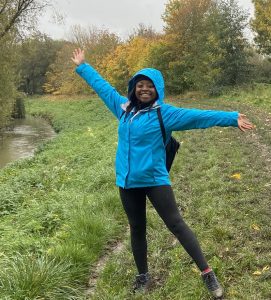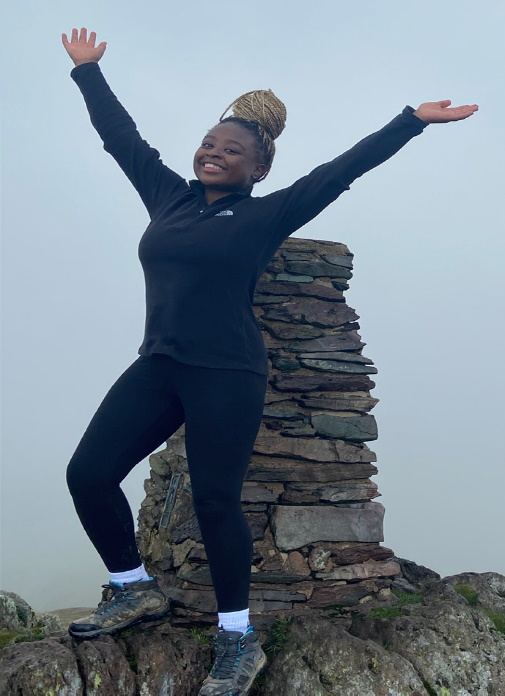“I was the only black person on my undergraduate geography course.”
Black Geographers is an expanding support network for Black geography students and graduates. The network wants to encourage more Black students on geography courses and is campaigning for a more engaging and inclusive curriculum. Award-winning geographer, writer and founder, Francisca Rockey, tells us how and why she set up Black Geographers.
Black Geographers have identified four main barriers preventing Black students from studying geography:
Isolation: Feeling isolated in geography courses at all levels of higher education, from undergraduate to postgraduate and PhD. Being the only visible minority on fieldwork in remote greenspaces, towns or villages fuels this sense of isolation, as does feeling unsafe, unwelcome or fearful of hostile encounters in the workplace.
Limited access to postgraduate study: Some careers relating to geography, geology or the environmental sciences require a master’s degree, including academic careers and graduate schemes in environmental consultancy. The government master’s loan barely covers postgraduate course costs, and increased living costs mean low-income students cannot access higher education beyond undergraduate studies.
Limited financial means: For Black students from low-income backgrounds, accessing postgraduate study or doing unpaid internships is not viable. Other sectors, such as finance, for example, tend to offer higher graduate salaries and paid internships.
Lack of guidance, support and career knowledge: Geography students are less likely to pursue a career in the field if they do not know people in academia or the environment sector. Given the lack of Black geographers, it is more likely that Black students will not be aware of the opportunities geography can offer, nor have access to a network and role models for guidance and career inspiration.
How did you come up with the idea of creating a community of Black geographers and geoscientists?
I came up with the idea of creating a community for Black geographers and geoscientists after finding that I was the only Black person on my undergraduate geography course, and I found the experience very isolating. I decided to set up an Instagram page to try to connect Black people in geography and the rest is history!
How easy was it to set up?
I launched my campaign during a time when we couldn’t go outside, due to COVID-19 restrictions, and people were spending a lot of time on social media. So, I took advantage of the increased activity on Twitter, Facebook, LinkedIn and other social platforms to get my message across and ensure that there would be people listening. Within a matter of weeks, our campaign had reached mainland Europe, Asia, South America and North America.
Lockdown gave us the time to discuss issues that prevent inclusivity, accessibility and diversity in geography, and we were able to facilitate transnational discussions. I am no expert, but social media is a very powerful tool and a great way to share your message far and wide. As I discovered with the Black Geographers campaign, you never know where your campaign will end up.
How does Black Geographers help students overcome some of the barriers they face?
We provide career resources, mentoring, networking and internship opportunities for the students and academics we work with. We also work with other educational institutions and geography organisations to improve representation, accountability and access across schools and universities.
For example, in 2020 we collaborated with Esri UK to create the Geospatial Scholarship Fund. The scholarship aims to:
– Help promote geography and geoscience as a positive life choice for students.
– Provide financial and other support for students throughout their studies.
– Increase the number of Black and mixed Black heritage students studying and working in these disciplines.
In your 2020 report: Participation of Black students in geography, it mentions that the geography curriculum does not engage with the issues Black students care about. What are those issues?
This statement is in reference to case studies that are used to increase people’s understanding of social environmental issues. A question I have for curriculum leaders is whether the case studies being used are representative of the student cohort and the issues that are topical within the local area. For example, air pollution is a huge environmental issue in London. There are a range of case studies we can use when teaching students living in and around the M25 motorway that they can relate to because it is happening on their doorstep. This also encourages students to get involved in their local area.
There also needs to be an awareness of the type of case studies we use for different racial groups and the language we use to describe other cultures and countries in the global South. For example, we should not use the word ‘slums’ to describe informal settlements.
Why are mentors so important?
Mentors are important because they offer guidance and insight into your chosen career path. If you don’t have any friends or family working in a specific area, a mentor can connect you with people working in your dream job, assist you with job or internship applications, and offer one-to-one support on your journey, particularly if you’re in the early stages of your career. There is a wealth of careers within the environment sector and it can be difficult to know where to start, or what is available to you, if you don’t have a mentor or someone to guide you through your options.
What has been the best advice you have had from a mentor?
The most useful piece of advice I’ve had is to try everything, even jobs and sectors that aren’t directly related to your dream career. You learn something from every job, and different sectors, which you can then take with you on your career journey. I was also told that my career is a journey. It might take several years to get to your ideal role but that doesn’t mean you are on the wrong track.
What would you say to young people wanting to go further in geography?
As I’m sure you are aware, climate change and the future of our planet is a hot topic and if you would like to be at the forefront of climate discussions and working towards climate solutions, such as creating greener energy, rewilding to absorb more carbon or protecting our oceans and forests, then continuing your education in geography or geosciences, physical geography, Earth and environmental science or geology is the way to go. Everything I’ve been taught so far in my degree is relevant to current affairs, and by the time I finish my degree, I will be equipped with the tools to assist other scientists and researchers working to create a greener planet.
What is your vision for the future of Black Geographers?
I don’t have a concrete plan for the future of Black Geographers, but I hope in 5 years from now we are still supporting Black geographers and geoscientists and building meaningful relationships.
Meet Francisca

Originally, I chose geography as a second option. I wanted to study history, but my favourite history teacher left in Year 9 and I knew it wouldn’t be the same without him. What started as a second option to meet the requirements of the English Baccalaureate grew into a passion, far greater than I had for history, a strong emotion to know more about places and the relationships between people and our environment.
I remember writing my personal statement for my university application and being asked about my interest in geography and it came so naturally. I was intrigued by the natural features of the Earth and the dynamics of our changing world. Not only is geography relevant to current affairs, but we are also surrounded by characteristics of physical geography in our everyday lives, from the type of soil found in your local park to the drainage of your nearest river. Understanding where things happen and the differences between places is important in many contexts, from agriculture to infrastructure, and housing to the environment.
Writing gives me the most joy, 100%. At the age of 14 (almost 10 years ago), I started a blog called ‘Fran’s World’ to document my teenage years and get my writing ‘out there’. What started as a hobby grew into something a lot bigger and I was constantly looking for ways to make my corner of the internet bigger and better. On my blog, you would find lifestyle, travel and student-related content. I used to dabble in fashion, beauty and fitness from time to time; I wouldn’t say they were part of my niche, though.
I used to publish a new post every Wednesday at 12pm. Writing was (and still is) something that comes naturally to me, so I didn’t have to dedicate much time to it other than a few hours on a Sunday evening or a few hours before I was due to publish on a Wednesday. Having a schedule made it really easy to juggle my blog with studying and was how I managed to keep it going for several years. I no longer have a blog, but I do write for other publications such as gal-dem.
There are loads of different ways to use your passion to create change, you just have to find the right way for you. Ask yourself the following questions: What makes you curious? What are your passions and dreams? How can you combine your interests to change a certain issue you are passionate about?
My advice is to seek out a support network, people who have similar passions and interests, with whom you can share ideas, have discussions or work together to achieve common goals. A great support network for young people is Transform Our World. It’s an online community of educators empowering students to take climate action.
You could also try and find local community groups or projects related to the issue you’re are passionate about. For example, if you’re passionate about conservation and based in the UK, go to The Conservation Volunteers, enter your postcode and you’ll find conservation activities happening in and around your local area. If, like me, you enjoy writing, you can set up a free blog on WordPress or Blogger and communicate your passions to others.
About Black Geographers
Black Geographers formed as a collective of Black geography students and graduates who have first-hand experience of the many barriers which prevent Black students from studying geography, and how isolating the field can be even after navigating these barriers.
Through collaborative work, Black Geographers aims to not only encourage more Black students to study geography, but to also begin transforming geography as a discipline, to make it more engaging and inclusive at every level of education.
The network, across Instagram, LinkedIn, Twitter and Black Geographer’s newsletter, has grown to a community of 13K+ individuals.


